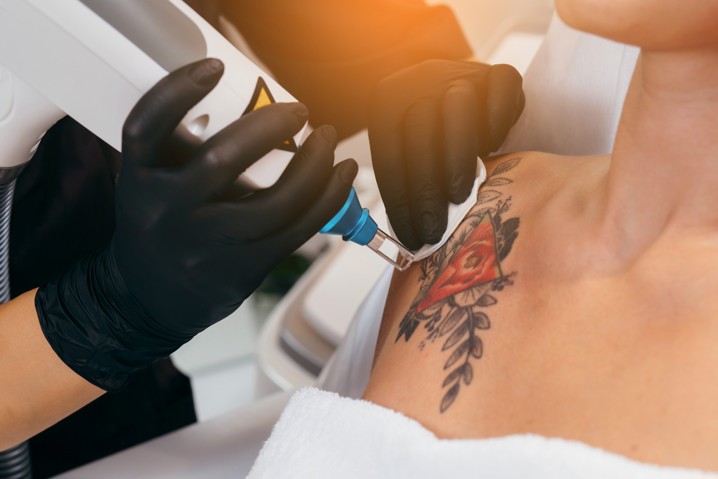

Feel better in your own skin with laser treatment to remove hyperpigmentation and tattoos.
The beauty of the face, body lines and even outfits often depend on the health and care of our largest organ – the skin.
Skin pigment is one of the basic characteristics of our identity, and factors such as texture or shade can play a big role in our appearance and self-confidence.
Therefore, it is not surprising when the appearance of hyperpigmentation awakens certain doubts about your health, or simply distorts your opinion of your own appearance.
Unlike a hairstyle that you can change or the look of your body that you can work on, changes in pigments have always been thought to be a phenomenon that stays with you forever, just like a tattoo.
But thanks to the development of aesthetic medicine and technology, the removal of unwanted pigmentation and tattoos has become a matter of routine.
At the Lohuis Filipović Polyclinic, we have been using the Q Switch Nd:YAG device for deep treatment of pigmentation changes such as tattoos, melasma, sunspots and other forms of hyperpigmentation for some time.
Hyperpigmentation is one of the common skin conditions that can be recognized by tissue of a darker shade than the skin pigment. Although most hyperpigmentation is harmless, its occurrence can cause insecurities about one’s appearance.
Hyperpigmentation most often occurs due to the action, i.e. exposure of the skin to sunlight. The action of UV rays stimulates a reaction in the layers of the skin that causes it to produce melanin, a compound that acts as a defense against UV rays.
Melanin synthesis is higher during the summer months, due to which we get the much-desired tanned complexion.
However, regardless of the intensity of UV rays, some areas of the skin will eventually begin to produce higher amounts of melanin, thus creating conditions such as sunspots, melasma, moles and other pigment changes.
Although in most cases these conditions are completely harmless, unevenness in the complexion can cause doubt in one’s own appearance, as well as a loss of self-confidence when interacting with others.
A distorted image of one’s own appearance can be the result of slightly more pronounced hyperpigmentation, which is why adequate removal does not have to be such an unrealistic decision.
By performing laser treatments with the Q Switch Nd:YAG device, we successfully remove pigmentation changes in order to even out the complexion and induce collagen production for faster tissue regeneration.
Some mistakes are easy to overcome, while other mistakes can stay on your skin – for a lifetime.
This attitude was typical just a few decades ago. However, from the advent of the first laser treatments until today, tattoo removal has become a routine procedure that provides an opportunity not to regret the mistakes you have made on your own skin.
The ink that penetrates the skin when creating a tattoo usually enters as deep as 3 mm, which is why most lasers have difficulty removing the darker pigment of the tissue without damaging the surrounding area.
Nevertheless, the development of technology has allowed us to remove tattoos without any permanent scarring or irritation of the surrounding tissue. By using the Q Switch device, we can remove tattoos in the deepest layers of the skin, without without visible traces or scarring and painful burns.
The Stellar M22 Q Switch module uses high-energy laser pulses that penetrate the deepest layers of the skin (2-3mm).
In contact with the pigment of the tattoo or hyperpigmentation on the skin, the laser beam is converted into thermal energy, which leads to the dispersion and disintegration of the pigment into smaller particles.
The laser beams will highlight the skin without tattoo pigment or hyperpigmentation, and the remaining pigment cells will be broken down through the body’s natural processes.
Unlike other laser devices, the Q Switch penetrates deeply into the layers of the skin, removing tattoo pigments that are usually found at a depth of 2mm.
Also, due to selective penetration into the deeper layers of the skin, it is possible to treat patients with darker pigment, with minimal risk of hyperpigmentation or hypopigmentation after treatment.
The treatment does not require thorough preparations, which is why it is easy to carry out. Before removal, an anesthetic cream is applied to relieve the burning sensation of the laser pulse.
The duration of the treatment depends on the size of the hyperpigmentation or tattoo you are trying to remove. The procedure usually takes no more than 60 minutes, and according to the dermatologist’s assessment, the treatment will need to be repeated 3 to 5 times.
Thanks to this technology, the Q Switch device allows us to successfully treat:
Tattoo removal is achieved by penetrating deeper into the layers of the skin, without irritating the surrounding areas.

A congenital nevus is a non-cancerous type of skin tumor consisting of a cluster of melanocytes. It develops before birth or during the first year of a child’s life. The Q Switch device successfully eliminates such phenomena, without without visible traces or scarring and serious side effects.
Becker and Otto’s nevi are benign spots that appear on the skin, often in male children during puberty. Although they are harmless in most cases, they can be removed if they present an aesthetic problem.
Some medications, such as tetracycline, can cause side effects such as hyperpigmentation. With the Q Switch device, we successfully remove such pigment changes.
Melasmas are recognizable by their mottled and brownish pigmentation. They are more common in people with darker complexions, and it occurs as a result of excessive melanin production. Q Switch treatment successfully removes melasmas, evens out your skin tone.
Sunspots are a harmless phenomenon that occurs due to prolonged exposure to the sun and UV radiation. They are formed as a result of excessive melanin production, and can be laser removed if they pose an aesthetic problem.
Isolated hyperpigmentation refers to localized dark spots on specific areas of the skin. If they stand out from the rest of the body’s pigment, especially in prominent areas, laser removal could be an option that will even out the pigments and provide “skin toning”.

Recovery after Q Switch laser treatment may be accompanied by conditions such as redness and mild irritation resembling sunburn.
Slight peeling and peeling of the surface layers of the skin is possible. Most often, there is no recovery, especially if the tattoos are not treated, and immediately after the treatment you return to all your activities.
For a speedy recovery, the following guidelines should be followed:
Showering with hot water could further irritate the sensitive area. For this reason, it is recommended to rinse with lukewarm water.
After the treatment, the skin is vulnerable and sensitive, and prolonged exposure to the sun could prolong the recovery period and prevent optimal therapy results. Avoid prolonged sun exposure for at least 2 weeks before and after the treatment to achieve the best treatment results.
Conditions such as redness, swelling or irritation can be reduced by using cold compresses.
For maximum protection against UV radiation, it is necessary to regularly apply sunscreens.
At the Lohuis Filipović Polyclinic, we have gathered experts with many years of experience in the field of aesthetic medicine, but also provided equipment that significantly facilitates a number of treatments, without the need for a long recovery and unwanted side effects.
With the Q Switch laser treatment, we remove hyperpigmentation of all kinds in a minimally invasive way, such as tattoos that you no longer want to have on your skin.
Correct the results of unwanted tattoos and remove pigmentation that made you feel insecure in your own skin.
Make an appointment for a check-up and find out how these changes in your skin can be removed without any discomfort, pain or permanent consequences.
The main goal of LF Polyclinic is to improve the quality of life and health of our clients by providing them with top-notch healthcare services.